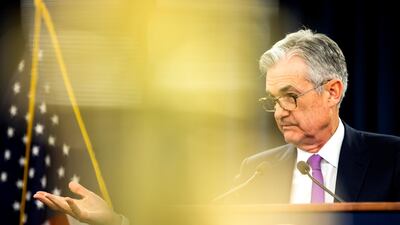Now that the US Federal Reserve has completed the U-turn taking it from hawkish to dovish, further interest rate hikes appear to be fading in the rear-view mirror. The central bank has prioritised external factors like China’s slowdown and a hard Brexit over domestic economic factors.
To be fair, the Fed has been consistent in pinpointing the trade dispute with China as a source of instability and a threat to economic growth in the United States. A hard Brexit is a new concern, probably based on the threat that US trading partners in the European Union will face considerable losses if Britain crashes out of the bloc without an interim agreement to smooth the way forward. Stuck on the twin spikes of Brexit and China’s slowdown is Italy already bleeding from a recession and Germany’s GDP growth has been injured.
In response to the worsening global economic picture, the Fed has decided to avoid "tapping the brake" in the form of interest rate hikes. It should be noted that the central bank also said it could tap the brakes anytime there is a rise in US inflation rates, signalling it is not quite over concerns about domestic economic overheating. This perspective is borne out by rising employment and other solid performances from the US economy, so it may be premature to assume that there may be no new rate hikes this year. By the same token, recessions can take place even when employment seems strong, so it’s unwise to assume anything at this stage.
As far as the equity markets are concerned, the Fed’s turnaround is a change in the right direction. Reassured by the prospect of a pause on interest rate hikes, borrowers and investors appear to feel more confident. At the time of writing, green lights can be seen across global stocks, a phenomenon which has happened less and less since the end of the bull run in US stocks amid rising interest rates and fears that the slowdown in China could trigger a global recession. Investors shouldn’t get too comfortable however, it only takes the next gloomy economic indicator from China to reverse gains in global equity markets, starting with those in Asia.
Not every market participant is happy with the Fed's dovishness. Higher interest rates are the reason banks make income and profits, so the financial sector has reason to crave rate hikes – which would contribute to the bottom line. The same goes for the US and US dollar-pegged bond markets relying on strong economic growth and higher key interest rates for yields.
Looking ahead, I expect the situation to be clarified in March when the trade truce is set to end and the Brexit process is due to be finalised. Depending on the final results of these incredibly important geopolitical events, China and the EU’s economic outlooks may either fall or rise, channelling the Federal Reserve’s monetary policy into further dovishness or another U-turn back towards hawkishness.
Hussein Sayed is the chief market strategist at FXTM

